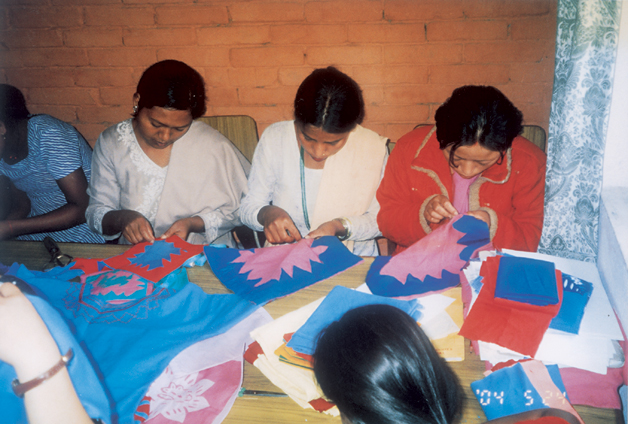
‘‘Victims must not be pitied but rather, they need to be given appropriate skills for living a normal life’’
With the motto above, ‘Meet Nepal’, a social service organization concentrates its efforts on rehabilitating exploited women workers of dance bars and cabin restaurants. Shashi Sharma, chairperson of Meet Nepal, is of the view that it is not only that victims of exploitation need to be taken care of, but the very fact that the profession is in itself a demeaning one, makes all the women, victims. The 5-year old organization has taken upon itself the challenge to wean away girls from such a vocation and at the same time, is conducting a sustained campaign to ensure the safety and rights of all girls working in dance bars and cabin restaurants. “Of course it would be much better if girls had the option of working in better professions,” says the demure Shashi. “But, since one cannot root out the problem immediately, it is vital that someone should play the role of guardian to so many of these girls who really have nobody else in this city to look after them.”
Almost all of the estimated one to two hundred thousand girls in this profession in the valley are from distant places. One need not look far for the reasons for them choosing such a profession, which everybody agrees is humiliating. Obviously, economic hardships, lack of better education and so, opportunities, and the widespread and prolonged conflict have all taken their toll. “Many of these girls even work without a salary,” informs Shashi. “They are thankful that at least they get two square meals a day.” If such is the situation, then it only reflects on the total apathy of governmental bodies and the complete failure of lawful systems. “There are no laws to safeguard their rights,” says the chairperson. In the absence of such safeguards, these girls are at the mercy of all, especially, corrupt policemen and exploitive restaurant owners. And, in a profession such as restaurants where competition is stiff and clients are limited, it is but natural that most restaurateurs will rather look the other way when molestation occurs, than defend the girls’ honour. No doubt, not all restaurants exploit their women workers, but it must be emphasized that this vocation is such that girls become extremely vulnerable and easily oppressed.
Today, Meet Nepal, with its central office in Old Baneswar, Kathmandu, is valiantly playing the much needed role of guardian angel. In fact, according to Shashi, it was the first NGO to focus on this sector. “The problem is not limited only to Kathmandu, it is widespread all over the country,” she says. She estimates that, nationwide, there must be close to five hundred thousand women in this profession. In response to this, the organization has also opened branches in Nepalganj (Bardiya), Hetauda (Makwanpur), Itahari (Sunsari) and Haraicha in Morang district. Meet Nepal is also playing an active role in creating public awareness and advocating for oppressed women’s rights. Recently, on the 11th of June, the organization put on public display at the Gurukul Academy, a documentary film detailing the exploitation of women working in dance bars, cabin restaurants and massage parlours.
It is indeed praiseworthy that there are women like Shashi Sharma who have taken on the burden as a call to their conscience. She says, “About five years ago, when I was doing my Master’s I came to know a woman working in a dance restaurant and I was troubled to hear of her ordeals. Somehow she found me in me a sort of support on whom she could confide. The tales she narrated about the exploitation going on in cabin restaurants made my skin crawl. I also realized that there was no organization to protect this sector. This forced me to think that somebody like me who was well educated, must be more sensitive to such a distressing social problem.” Meet Nepal’s modus operandi is usually to first do research through extensive surveys. Making particular efforts to identify those women who want to escape from their debasing environment, the organization calls them to the office where they are offered vocational guidance followed by training. In such cases the girls are generally rehabilitated and reintegrated into respectable society after a year or two. The organization has also made it a point to include victims on its board. “50% of the board members are victims,” informs Shashi.
Shashi has her ancestral roots in Khotang but has lived the better part of her life in Itahari. Currently, she is busy from 6:00 am to 6:00 pm running Meet Nepal where, at a time, 70 to 100 women are being trained in vocational skills that include patchwork, knitting and embroidery as well as sewing and cutting. “Most of these women are illiterate and moreover, are unfit for other work because they lack skills and training,” Shashi explains. “They are compelled to enter demeaning professions because they see no other option to earn their daily bread.” Shashi is however proud to inform that very recently, her trainees have opened nine new respectable business establishments. “We provide them with the needed equipment such as sewing machines as well as a revolving fund of NRs.12,000/- to set up their businesses.”
But of course, as everywhere else, funds is a major problem for Meet Nepal. According to Shashi, they are dependant on funds provided by INGOs as there is almost no support from the government. Shashi says, “INGOs, even if they agree to fund a project, insist on having only a year-long agreement at a time. You can imagine how this will adversely affect long term projects. Besides, they have become very selective and funds are not so forthcoming.” Sharma also does not sound too enthusiastic about the operating systems in some INGOs where she feels that officers often play favourites while selecting beneficiary NGOs. In fact, according to the chairperson, she has had to take a bank loan mortgaging her property to run Meet Nepal. “The interest is as high as 17%,” she mourns. “Banks are not keen on financing social service organizations.”
In addition, it is very sad to note that corporate houses and big businesses which do not hesitate to fund football teams and award motorcycles and expensive cars to sportspersons, are yet to sponsor such worthwhile projects as part of their much flaunted corporate social responsibility.
Address:
Meet Nepal Central Office
P O Box. 9167, Kathmandu
Ph:4471797, Mo. 9841272214











